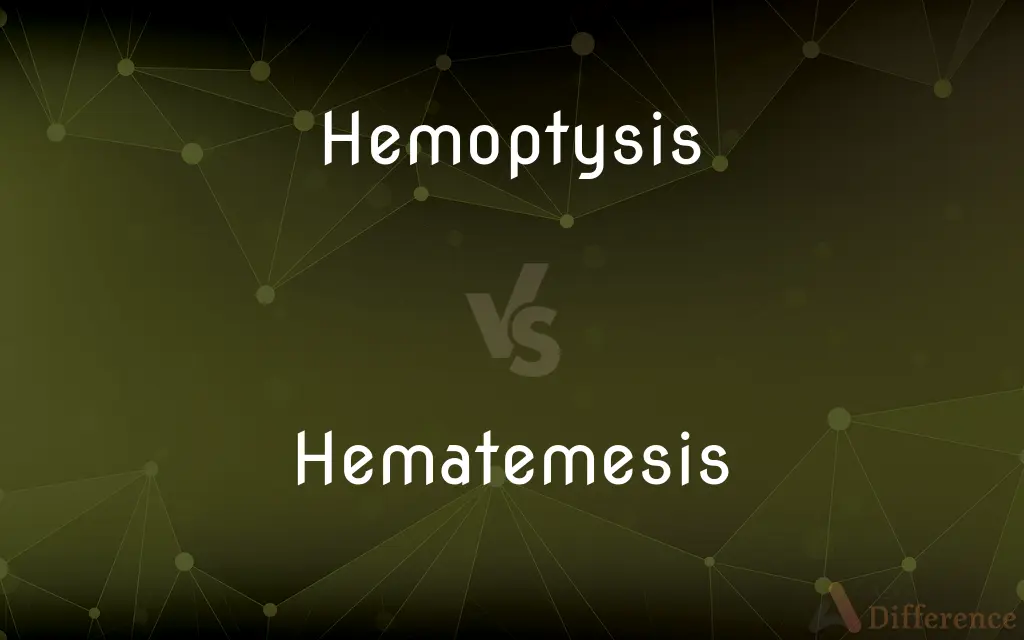Hemoptysis vs. Hematemesis — What's the Difference?
By Tayyaba Rehman & Maham Liaqat — Updated on March 10, 2024
Hemoptysis involves coughing up blood from the respiratory tract, while hematemesis is vomiting blood from the gastrointestinal system.

Difference Between Hemoptysis and Hematemesis
Table of Contents
ADVERTISEMENT
Key Differences
Hemoptysis is the medical term for coughing up blood from the lungs or bronchial tubes, often due to respiratory diseases or infections. On the other hand, hematemesis refers to the act of vomiting blood, which usually originates from the upper gastrointestinal tract, such as the esophagus, stomach, or small intestine, often indicating ulcers, tears, or other gastrointestinal disorders.
The color and consistency of the blood can help differentiate the two conditions. Hemoptysis typically presents with bright red, frothy blood, mixed with mucus, due to its origin in the respiratory tract. Whereas, in hematemesis, the blood might appear darker, resembling coffee grounds, due to its interaction with gastric acids.
The underlying causes of hemoptysis can range from bronchitis and pneumonia to more severe conditions like lung cancer or pulmonary embolism. In contrast, hematemesis is often caused by conditions such as peptic ulcers, gastritis, or varices in the esophagus or stomach.
The diagnostic approach also differs; hemoptysis may require chest X-rays, CT scans, or bronchoscopy to identify respiratory issues. Hematemesis might necessitate endoscopy or other gastrointestinal studies to locate the source of bleeding within the GI tract.
Both conditions require urgent medical attention, but the treatment strategies vary. Hemoptysis might involve antibiotics, bronchodilators, or even surgery, depending on the cause. Hematemesis treatment could include medications to reduce stomach acid, endoscopic procedures to stop bleeding, or surgery in severe cases.
ADVERTISEMENT
Comparison Chart
Definition
Coughing up blood from the respiratory tract.
Vomiting blood from the gastrointestinal system.
Origin of Blood
Lungs, bronchial tubes.
Esophagus, stomach, small intestine.
Blood Appearance
Bright red, frothy, mixed with mucus.
Darker, coffee ground-like due to gastric acids.
Common Causes
Bronchitis, pneumonia, lung cancer, pulmonary embolism.
Peptic ulcers, gastritis, esophageal varices.
Diagnostic Approach
Chest X-rays, CT scans, bronchoscopy.
Endoscopy, gastrointestinal studies.
Compare with Definitions
Hemoptysis
Coughing up blood originating from the respiratory tract.
The patient's hemoptysis was diagnosed as a symptom of advanced bronchitis.
Hematemesis
Vomiting of blood from the gastrointestinal system.
Hematemesis was a critical sign of the patient's peptic ulcer.
Hemoptysis
May present with bright red, frothy blood.
The bright red, frothy blood confirmed the doctor's suspicion of hemoptysis.
Hematemesis
Indicates serious GI tract issues.
The sudden onset of hematemesis necessitated an immediate endoscopy.
Hemoptysis
A sign of underlying lung conditions.
Hemoptysis in the case indicated a possible pulmonary embolism.
Hematemesis
Blood may appear dark or like coffee grounds.
The dark, coffee-ground appearance of the vomit was indicative of hematemesis.
Hemoptysis
Can be associated with infections like tuberculosis.
Tuberculosis can lead to severe hemoptysis.
Hematemesis
Often related to ulcers or varices.
Esophageal varices were the underlying cause of the patient's hematemesis.
Hemoptysis
Requires diagnostic imaging to identify the source.
A chest X-ray was ordered to investigate the cause of the patient's hemoptysis.
Hematemesis
Treated with acid-reducing medications or endoscopic procedures.
To treat the hematemesis, the doctor prescribed proton pump inhibitors.
Hemoptysis
Hemoptysis is the coughing up of blood or blood-stained mucus from the bronchi, larynx, trachea, or lungs. In other words, it is the airway bleeding.
Hematemesis
Hematemesis is the vomiting of blood. The source is generally the upper gastrointestinal tract, typically above the suspensory muscle of duodenum.
Hemoptysis
The expectoration of blood or of blood-streaked sputum from the larynx, trachea, bronchi, or lungs.
Hematemesis
Blood within vomitus; the vomiting of blood.
Hemoptysis
(medicine) expectoration (coughing up) of blood from the respiratory system
Hematemesis
A vomiting of blood.
Hemoptysis
The expectoration of blood, due usually to hemorrhage from the mucous membrane of the lungs.
Hematemesis
Vomiting blood
Hemoptysis
Coughing up blood from the respiratory tract; usually indicates a severe infection of the bronchi or lungs
Common Curiosities
What is hemoptysis?
Hemoptysis is the medical term for coughing up blood from the respiratory tract.
Can hemoptysis be a sign of a serious condition?
Yes, it can indicate serious respiratory conditions or infections.
How can hematemesis be diagnosed?
It is often diagnosed with endoscopy or other gastrointestinal studies.
Is hematemesis a medical emergency?
Yes, hematemesis can indicate severe gastrointestinal issues and requires urgent care.
How is hemoptysis diagnosed?
It may be diagnosed with chest X-rays, CT scans, or bronchoscopy.
How is hemoptysis treated?
Treatment varies from antibiotics and bronchodilators to surgery, depending on the cause.
How is hematemesis treated?
Treatment might involve medications, endoscopic procedures, or surgery.
What should one do if experiencing hemoptysis or hematemesis?
Seeking immediate medical attention is crucial in both cases.
What causes hemoptysis?
Causes can include bronchitis, pneumonia, lung cancer, or pulmonary embolism.
What is hematemesis?
Hematemesis refers to vomiting blood originating from the gastrointestinal system.
Can both hemoptysis and hematemesis indicate cancer?
Hemoptysis can be a sign of lung cancer, whereas hematemesis can indicate gastrointestinal cancers.
Can stress cause hematemesis?
While stress can exacerbate gastrointestinal issues, direct causation of hematemesis is unlikely without underlying conditions.
What are common causes of hematemesis?
Common causes include peptic ulcers, gastritis, and esophageal varices.
Can children experience hemoptysis or hematemesis?
Yes, children can experience both, but the underlying causes may differ from adults.
Are there any risk factors for developing hemoptysis?
Smoking, chronic lung diseases, and infections like tuberculosis are risk factors.
Share Your Discovery

Previous Comparison
Hardcover vs. Paperback
Next Comparison
Induction vs. PlacementAuthor Spotlight
Written by
Tayyaba RehmanTayyaba Rehman is a distinguished writer, currently serving as a primary contributor to askdifference.com. As a researcher in semantics and etymology, Tayyaba's passion for the complexity of languages and their distinctions has found a perfect home on the platform. Tayyaba delves into the intricacies of language, distinguishing between commonly confused words and phrases, thereby providing clarity for readers worldwide.
Co-written by
Maham Liaqat














































